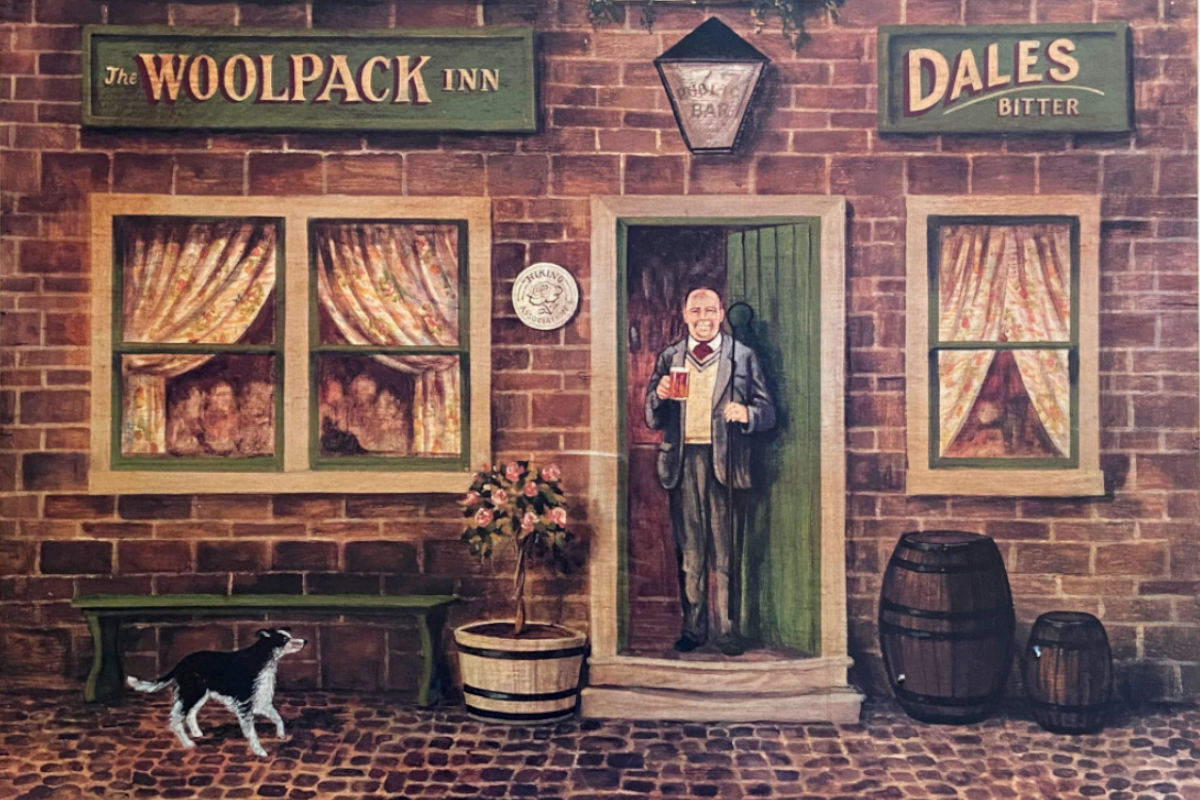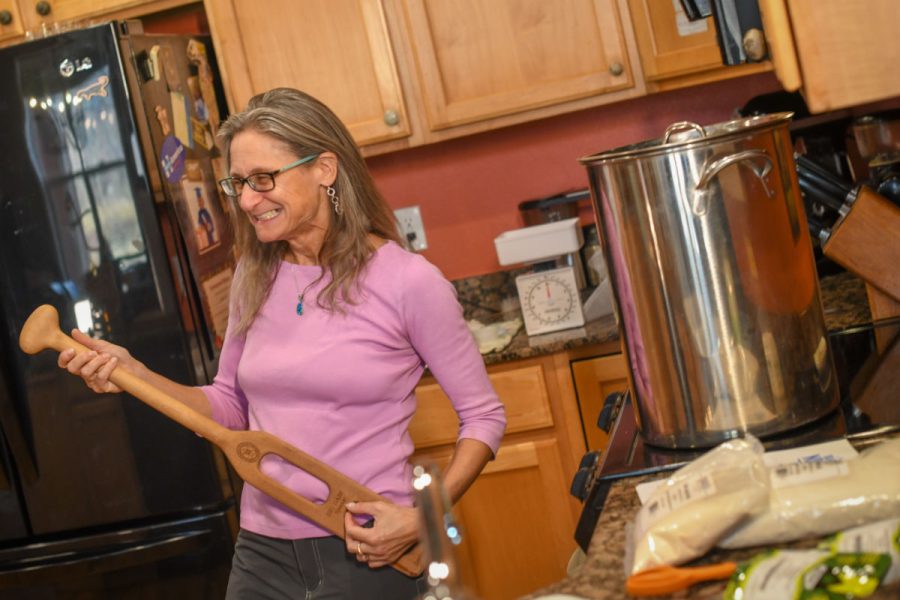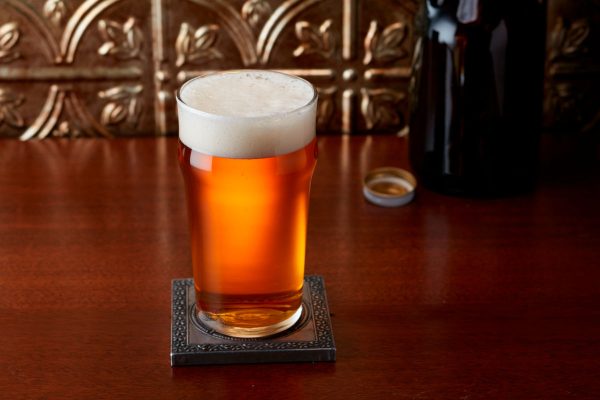
The following is American Homebrewer Association (AHA) Executive Director Julia Herz’s “Director’s Cut” column from the May/June 2024 Zymurgy magazine. Homebrew recipe below!
I have a painting in my office that is a romantic and poetic depiction of an elderly gentleman and his dog standing in front of an inn. In the painting, a little sign next to our smiling subject says, “Hiking Association.” His look says, “I’ve done my hiking work and earned my beer.” [See Beer Hiking in Bavaria on page 54.] For years I’ve romanticized this scene, and I look at it daily. Over time it inspired me to want to perfect an English bitter, what I imagine our hiking hero holds in his glass.
What’s In A Style Name
I’ve always had challenges with the name “bitter.” Bitter is not a very romantic name for a style. One would never name a wine style “acidic.” Yes, the style name “bitter” pre-dates sensory terminology by several hundred years, but like any homebrewer, I have the power to change things I brew, so I will henceforth encourage the world to refer to ESB as Extra Special Beautiful. Now on to my quest to perfect this style. I’m personally favoring Strong Bitter (11C in Beer Judge Certification Program 2021 Guidelines) over Ordinary and Best Bitter. It has more girth, mouthfeel, and residual sugar, yet is still very sessionable, with an ABV range of 4.6 to 6.2%.
Recipe Research
As any proper quest seeker should do, I reached out to some of the most renowned brewers of ESB, including Jamil Zainasheff. Jamil’s Fullers ESB clone (available on ProMash) and Brewing Network shows (see resources) got me started. Then, like Alice in Wonderland, I went down the rabbit hole. After brewing Jamil’s recipe, I decided to increase the mouthfeel and added both wheat and oats. Scandal, I know, but again as a homebrewer, we can do whatever the heck we want. I got good results, although a con was increased haze (beyond what you’d get from chill haze). Adding gelatin finings is an option.

Yeast
During my research, I noticed a wide variety of yeasts are used: London ESB, British Ale Yeast, Ringwood, West Yorkshire, etc. I’m a big fan of splitting batches and will continue to experiment until I land on precisely what makes my palate sing. Also, if you check out Jamil’s recipe, his fermentation schedule (and now mine) is off the rails in terms of temperature changes. If you don’t have the ability to control your fermentation temperatures, don’t sweat it. I am a big fan of moving fermenters to different rooms for different temperatures when needing a manual cheat. Also, it’s up to the homebrewer whether you want to coax or avoid diacetyl—that can be done by increasing or decreasing fermentation temperatures. Note: low levels are accepted for the style (plus it lends increased mouthfeel).
Base Malt
The choice of Maris Otter versus Golden Promise was on my mind. I’m a Golden Promise fan, so I went with that the second time. I’d need to do a side-by-side to truly dial in the difference. Brülosophy has one article on the test worth checking out (see Resources).
Hops
Hops used have common themes. They are always English: Target, Northdown, Challenger, Fuggle, and East Kent Golding (EKG), primarily. I encourage you not to skip using EKG for aroma, and I am a fan of dry hopping during conditioning to deliver increased aromatics.
Priming Sugar
I was out of priming sugar the first time I brewed it. Classic homebrewer weekend dilemma. Alas, I opted to use brown sugar instead. It was a fun experiment, although it tipped the flavor profile beyond style guidelines. Listen to the Dr. Homebrew episode (see Resources) for a sip-by-sip overview.
The Homebrew Recipe
You can find the full 6-gallon homebrew recipe in the AHA Recipe Library by clicking on the beer name below!

Resources
I would love to see notes from anyone on the ESB path. I also readily used the HomebrewersAssociation.org recipe database for National Homebrew Competition medal-winning recipes. I consider these recipes validated, and thus the most reliable. Visit HomebrewersAssociation.org/mj24 for links to the following resources:
- AHA Forum
- Brewing Network The Jamil Show
- National Homebrew Competition Recipe Database
- Brewing Classic Styles
- Brülosophy Maris Otter vs. Golden Promise
- Dr. Homebrew Julia Herz interview on my ESB
- BJCP 2021 Style Guidelines
Zymurgy Magazine:
Cheers to perfecting the perfect ESB (aka Extra Special Beautiful) and cheers to us homebrewers continuing to innovate, change, and evolve the beer world. P.S. Thank you to John Parrette (homebrewer), Jamil Zainasheff (AHA member and author of Brewing Classic Styles), Jonathon Mullens (brewer at Broad Ripple Brewpub), Tony McCauley (AHA member), and past NHC medal winners who did such a great job and took the time to share their recipes with the AHA.


Share Post